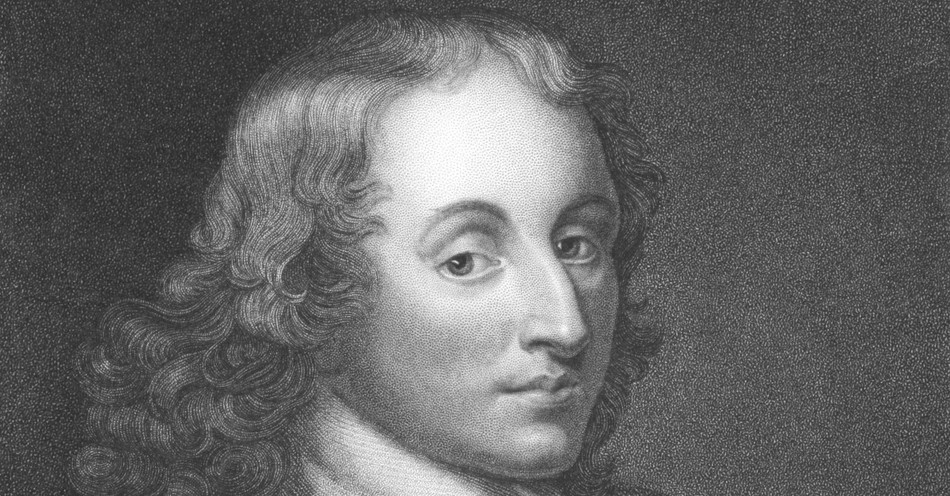Say you are a world-renowned scientist, credited with some of the greatest discoveries of all time. What more could you possibly want?
Blaise Pascal (1623-1662), the French genius who in his brief lifetime made numerous world-changing discoveries, knew there was much, much more.
Pascal grew up in Paris, schooled at home by his father. He showed early promise: At age eight he wrote his first scientific paper; at 16 he wrote a mathematical essay that broke new ground in the field of geometry.
Wait, there's more!
When he was 19, Pascal invented a calculating machine, a forerunner of modern computers. At 23, he made major discoveries in physics and proved the existence of the vacuum. This paved the way for hypodermic syringes, barometers, and hydraulic devices. Pascal also came up with the mathematical theory of probability and helped shape the field of calculus.
From his teens, he often suffered great pain in his legs; as an adult he became partially crippled. One night, unable to sleep due to the pain, he arose and wrote down the solution to a problem that advanced a very difficult area of mathematics.
Yet, though Pascal knew very well the power of the mind and the potential of human reason, he also knew that people cannot solve the deepest mysteries and needs of life with their minds alone. He understood that mankind is at the same time very great and very flawed.
Through various personal trials, Pascal became more and more a religious man. He was much affected when his niece was miraculously healed of a tumor. After he was nearly killed in a carriage accident, he was converted to a deep relationship with Jesus Christ.
The day on which he found peace with God was so important to him that he wrote a reminder of it on parchment and sewed it into the lining of his coat. He kept this coat for the rest of his life, and the note was found there when he died at age 39.
In it he told how he had come to know "the God of Abraham, God of Isaac, God of Jacob." He ended by writing, "I will not forget thy word."
In 1662, from the room where he lay painfully dying, Pascal observed the plight of the poor in the streets, having to trudge long distances while the rich comfortably rode. One of his last great ideas was the bus—public transportation.
The French Shakespeare?
Besides being a great scientist and mathematician, Blaise Pascal was a great Christian thinker, and one of France's greatest writers. It has been said, "Pascal is to France what Plato is to Greece, Dante to Italy . . .Shakespeare to England!"
Alexander Pope's tribute
His religious writings, called the Pensees, form a literary masterpiece. In them, Pascal observes that man is a paradox of greatness and weakness. The great English poet Alexander Pope wrote this poem in honor of Pascal's understanding of man:
Chaos of thought and passion all confus'd,
Still by himself abused or disabused;
Created half to rise, and half to fall;
Great lord of all things, yet a prey to all;
Sole judge of truth, in endless error hurl'd
The glory, jest, and riddle of the world.
God of philosophers
During Pascal's lifetime, the philosopher and mathematician Rene Descartes helped bring about major changes in western thought and a revolution in science. He taught that Nature was like a giant machine and could be unraveled and explained with the use of mathematics.
Though Descartes didn't eliminate God from his picture, his mechanical view of nature was one of the factors that convinced Pascal that ultimate truth could not be found through human philosophy. Our God, said Pascal, is not ". . .the god of philosophers."
Handmaid of religion?
At one time science was called the "handmaid of religion." Today many feel that physics, not religion, will answer life's deepest questions. Pascal would not agree. He knew life's deepest questions are: Who is my maker? Can I know him?
He didn't have time
Pascal is considered to have invented the wristwatch. He didn't see why one had to reach into a pocket to retrieve the watch to check the time.
A Selection from the Pensees
"Men never do evil so completely and cheerfully as when they do it from religious conviction.
What is more difficult, to be born or rise again? That what had never been should be, or that what had been should be again? It is more difficult to come into existence than to return to it.
It is dangerous to make man see his equality with the brutes without showing him his greatness. It is also dangerous to make him see his greatness too clearly, apart from his vileness. It is still more dangerous to leave him ignorant of both. But it is very advantageous to show him both.
Let each one examine his thoughts, and he will find them all occupied with the past and the future. We scarcely ever think of the present; and if we ever think of it, it is only to take light from it to arrange the future . . . So we never live, but we hope we live; and, as we are always preparing to be happy, it is inevitable we should never be so."
We come to know truth not only by reason, but still more so through our hearts.
The heart has its reasons that reason does not know.
What a vast distance there is between knowing God and loving him . . . Human things must be known to be loved: but Divine things must be loved to be known."
(First appeared on Christianity.com on April 28, 2010)
For a closer look at Pascal's conversion experience, read the article below by Diane Severence
Blaise Pascal's Conversion
Whenever we see a genius who has many talents—Leonardo da Vinci, Thomas Jefferson, or Benjamin Franklin, for instance—we call that person a Renaissance man. Blaise Pascal of France was a Renaissance man. He was a prominent mathematician, physicist, inventor, and Christian writer. He made important contributions to geometry, calculus, and helped develop the theory of probability. Pascal's law is the basis for hydraulic operations. At l9, he invented the world's first mechanical calculator. The computer language known as PASCAL was named after him.
Pascal grew up accepting the Bible as God's word, but in a rather abstract way. He looked into Jansenism, a Catholic reform movement that emphasized the Augustinian (and Calvinist) concept of grace. Nonetheless, he lived with a sense of spiritual desperation. Disgusted with himself he once wrote: "If one does not know himself to be full of pride, ambition, concupiscence, weakness, pettiness, injustice, one is very blind. And if, knowing this, a man does not desire to be delivered, what can one say to him?"
On this day, November 23, 1654, Pascal's horses bolted and plunged off a bridge. Pascal was thrown into the roadway. He saw this as a warning directly from God. That night he experienced a Christian conversion that would cause his outstanding scientific work to take second place in his pursuits. Light flooded his room. He recognized Jesus, the Word. For the rest of his life Pascal carried around a piece of parchment sewn into his coat—a parchment inscribed with ecstatic phrases:
"God of Abraham, God of Isaac, God of Jacob, not of the philosophers and scholars... Joy, joy, joy, tears of joy...' This is life eternal that they might know you, the only true God, and Jesus Christ, whom you have sent.' Jesus Christ. Jesus Christ... May I not fall from him forever... I will not forget your word. Amen."
From that day forward, Blaise Pascal realized even more deeply that he must live primarily for God. He started out by giving much more to the poor.
Pascal closely associated himself with the Jansenists, a group of Catholics that emphasized morality in all aspects of life. In 1657 Pascal published his Provincial Letters which criticized the moral teaching of the Jesuits, the rationalism of Descartes, and Montaigne's skepticism; and which urged a return to Augustine's doctrines of grace. Voltaire described the collection as "the first work of genius to appear in France," (meaning the first such in French colloquial literature); it continues to be recognized as such.
Pascal also wrote that we come to know God's truth not only by reason, but even more through the heart by faith. It is through our heart that we come to know God and to love Him. It is by faith that we can come to know Christ—and God alone gives us faith.
Bibliography:
1. Adapted from an earlier Christian History Institute story.
2. Bell, Eric Temple. Men of Mathematics. New York, Simon and Schuster, 1937.
3. Cailliet, John A. The Clue to Pascal. Port Washington, N.Y.: Kennikat, 1943.
4. Coleman, Robert E. "Blaise Pascal" in Chosen Vessels: portraits of ten outstanding Christian men; edited by Charles Turner. Ann Arbor, Michigan: Vine Books, 1985.
5. D'Souza, Dinesh. The Catholic Classics. Huntington, Indiana: Our Sunday Visitor, 1986.
6. Pascal, Blaise. Pensées de M. Pascal sur la religion et sur quelques autres sujets 1670 (The Pensees; many English versions).
7. Pascal, Blaise. Provincial Letters. (Various editions).
8. "Pascal, Blaise." Dictionary of Scientific Biography. Editor Charles Coulston Gillispie. New York: Scribner's, 1970.
9. "Pascal, Blaise." Edwards, Paul, editor. The Encyclopedia of Philosophy. New York, Macmillan, 1967.
10. Rosenberg, Jerry M. The Computer Prophets. London: Macmillan, 1969.
11. Runes, Dagobert D. A Treasury of Philosophy. New York: Philosophical Library, 1945.
12. Wolff. Breakthroughs in Physics, p. 130.
("Blaise Pascal's Conversion" by Diane Severence, Ph.D., edited by Dan Graves, MSL, first appeared on Christianity.com on April 28, 2010)
Photo Credit: Getty Images/GeorgiosArt
This article is part of our People of Christianity catalog that features the stories, meaning, and significance of well-known people from the Bible and history. Here are some of the most popular articles for knowing important figures in Christianity:
How Did the Apostle Paul Die?
Who are the Nicolaitans in Revelation?
Who Was Deborah in the Bible?
Who Was Moses in the Bible?
King Solomon's Story in the Bible
Who Was Lot's Wife in the Bible?
Who Was Jezebel in the Bible?
Who Was the Prodigal Son?









